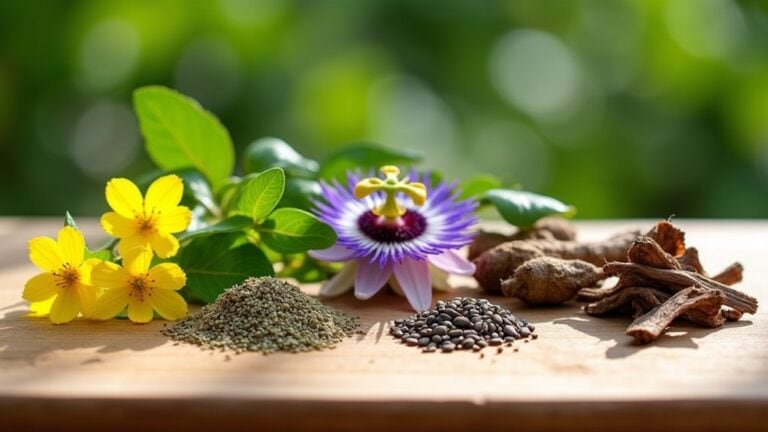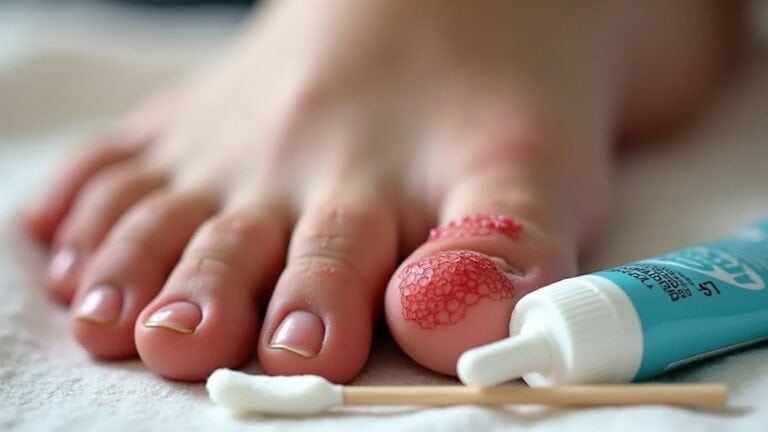You know that nagging itch on your scalp that feels like an unyielding tickle? It’s frustrating, particularly at times you’re trying to focus on your day. Thankfully, you don’t have to put up with it. Instead, consider exploring natural remedies that can soothe your dry, itchy scalp. From soothing aloe vera to the invigorating touch of peppermint oil, there are solutions that not only help relieve the itch but also nourish your scalp, setting the stage for healthier hair.
Apple Cider Vinegar
Should you’ve ever experienced the discomfort of a dry, itchy scalp, you know how irritating it can be. A popular home remedy, apple cider vinegar, could possibly be your scalp’s new best friend. Thanks to its acetic acid, it helps balance your scalp’s pH and reduce that annoying itchiness.
You can mix 1-2 tablespoons of apple cider vinegar with a cup of water for a soothing rinse. Its antifungal and antibacterial properties can tackle irritants, while the malic acid naturally exfoliates dead skin cells that cause flakiness.
Applying a 1:1 ratio of vinegar to water for five minutes before rinsing soothes inflammation from scratching. You’re not just calming your scalp; you’re restoring balance and promoting healthier skin in general.
Coconut Oil
Coconut oil could just be your new best friend for a dry, itchy scalp. Packed with lauric acid, it not only moisturizes but also helps fight pesky conditions like dandruff.
Plus, it’s super easy to use—just massage a bit into your scalp and let it work its magic before shampooing!
Moisturizing Properties Explained
At the time it comes to finding relief for a dry, itchy scalp, using coconut oil can be an effective solution that delivers impressive results. Coconut oil, rich in lauric acid and fatty acids, forms a protective barrier that aids in moisture retention.
This barrier markedly combats scalp dryness, locking in hydration and enhancing your skin barrier’s function. Studies show coconut oil can improve skin hydration through up to 32%, offering a soothing solution for those managing flakiness and itching.
Additionally, its antimicrobial properties can help prevent infections, which could further aggravate your condition. With consistent use, you’ll likely notice a reduction in inflammation, leading to a healthier, more comfortable scalp.
Antifungal Benefits Overview
At the time you’re handling a dry, itchy scalp, grasping the antifungal benefits of coconut oil can be a breakthrough. This oil, rich in lauric acid, effectively combats common scalp fungi like Malassezia, which can lead to dandruff. Medical research shows that coconut oil disrupts fungal cell membranes, slowing the growth of those pesky microorganisms.
Notably, studies indicate it’s as effective as ketoconazole shampoo for treating scalp fungal infections. Plus, the additional capric and caprylic acids in coconut oil further soothe your scalp through reducing flaking and irritation.
Applied topically, this oil maintains its antifungal activity for up to 48 hours, giving you prolonged protection against those fungi that cause discomfort and itching in your hair and skin.
Application Tips and Techniques
Once you’re ready to tackle that nagging dry, itchy scalp with coconut oil, a few smart application techniques can make all the difference. Here are some tips to help improve moisture retention:
- Warm the coconut oil: Rub 1-2 tablespoons between your palms to boost absorption before you apply it.
- Massage gently: Work the oil into your scalp using circular motions for 5-10 minutes. This helps loosen flakes and stimulates blood flow.
- Let it sit: For deeper hydration, leave the oil on for at least 30 minutes or overnight. Rinse with a mild shampoo afterward.
Feel free to mix coconut oil with a few drops of tea tree oil for extra benefits, adjusting frequency based on how your scalp responds.
Tea Tree Oil
Provided you’re struggling with a dry, itchy scalp, tea tree oil could just be your new best friend. This powerful oil boasts antifungal properties that target Malassezia yeast, a common culprit behind dandruff and scalp irritation.
Research shows that using a 5% tea tree oil shampoo can reduce scalp itching by up to 41% over four weeks. However, it’s crucial to blend tea tree oil with a carrier oil like coconut or jojoba, as it can cause skin irritation if undiluted.
Its antimicrobial activity also helps combat bacteria and fungi that contribute to your scalp issues. Through integrating tea tree oil into your routine, you may just find the relief you’ve been searching for in these natural remedies.
Aloe Vera
Aloe vera’s anti-inflammatory properties could be just what your dry, itchy scalp needs.
This natural remedy not only soothes irritation but also helps keep your scalp moisturized, making it feel more comfortable and healthy.
Through integrating aloe vera into your routine, you may notice a significant reduction in itching and improved skin hydration.
Anti-inflammatory Benefits
Provided you’re handling an itchy, dry scalp, you could feel like you’ve tried every product under the sun without much relief. That’s where aloe vera gel shines with its anti-inflammatory benefits, especially for conditions like seborrheic dermatitis.
It’s time to give your scalp the soothing love it deserves. Here are three powerful reasons to try it:
- Aloe vera markedly reduces inflammation and itching, aided through its ability to inhibit prostaglandin E2 production.
- Glycoproteins in aloe block histamine release, cutting itch intensity through nearly 40%.
- Its skin barrier repair effects enhance collagen production, healing dryness-induced microtears.
Make aloe vera a part of your health and hair care routine, and experience the relief you’ve been yearning for.
Moisturizing Properties
While combating a dry, itchy scalp, it’s essential to uncover effective methods to maintain your skin moisturized and content. Aloe vera is a fabulous option for its impressive moisturizing properties. This natural remedy is packed with polysaccharides that deeply hydrate your scalp, alleviating dryness and flakiness. Plus, it contains glycoproteins that help reduce inflammation and proteolytic enzymes that combat dead skin cells, improving moisture retention. Clinical studies show aloe vera can increase scalp hydration levels through 35% compared to placebo treatments.
| Benefit | Explanation |
|---|---|
| Deep Hydration | 99% water content that revitalizes the scalp |
| Moisture Retention | Polysaccharides provide lasting hydration |
| Flake Removal | Proteolytic enzymes eliminate dead skin cells |
Olive Oil
At times you’re handling a dry, itchy scalp, olive oil could just turn into your new best friend. This natural remedy offers some fantastic benefits for your scalp, thanks to its anti-inflammatory properties and ability to aid moisture retention.
Here are three reasons to give it a try:
- It can soothe irritation through calming inflammation and providing relief.
- Olive oil’s fatty acids help restore your skin barrier, reducing moisture loss.
- While massaged in, it loosens flakes from conditions like seborrheic dermatitis or dandruff, tackling that annoying itch.
Plus, research shows that olive oil could even slow down Malassezia yeast growth, easing your scalp irritation.
Warm it up, apply it, and enjoy the comforting relief!
Witch Hazel
Provided you’ve ever found yourself scratching your head in frustration because of dryness, witch hazel could just be the soothing solution you need. This natural remedy boasts a range of benefits for a dry, itchy scalp. Its astringent properties help balance oil production, preventing over-drying while calming scalp inflammation. Plus, witch hazel’s antibiotic properties make it effective against scalp infections. Just apply diluted witch hazel to your scalp, and you could find relief in no time!
| Benefit | Description |
|---|---|
| Scalp Inflammation | Reduces redness and swelling |
| Wound Healing | Accelerates recovery for scratched scalps |
| Itchy Scalp Relief | Soothes the incessant urge to scratch |
| Oil Production | Balances without stripping moisture |
Peppermint Oil
Provided you’re battling a dry, itchy scalp that feels impossible to soothe, peppermint oil could just be your new best friend. This invigorating oil not only delivers a cool menthol sensation but also reduces scalp itchiness markedly within two weeks whenever applied regularly.
Here are a few ways to utilize its benefits:
- Dilute peppermint oil with olive oil or water to prevent skin irritation.
- Gently massage the mixture into your scalp, enhancing absorption and blood circulation.
- Enjoy the anti-inflammatory properties that promote healthier hair follicles and relieve dryness.
Jojoba Oil
Provided you’ve been struggling with a dry, itchy scalp, jojoba oil could just be the miracle worker you need. This natural oil mimics your scalp’s sebum, balancing oil production and reducing dryness. It boosts skin hydration up to 43%, helping to soothe any irritation. With its anti-inflammatory properties, jojoba oil can also alleviate itchiness linked to conditions like eczema or psoriasis. Fortified with vitamins E and B-complex, it promotes scalp health and reduces flaking while offering antimicrobial effects against dandruff.
| Benefit | Detail |
|---|---|
| Skin Hydration | Improves hydration up to 43% |
| Anti-Inflammatory Properties | Soothes irritation from conditions like eczema |
Using jojoba oil could give your scalp the relief it desperately needs.
Meditation
While you mightn’t consider meditation as a remedy for a dry, itchy scalp, it turns out that carving out a few minutes for mindfulness can make a significant difference.
Engaging in meditation not only calms your mind but could also help reduce stress-related scalp itch. Research shows that mindfulness meditation lowers cortisol levels, resulting in less itching and less inflammation.
Here are three powerful benefits of meditation for your scalp health:
- Improved blood flow to the scalp increases moisture retention and promotes healing.
- Guided imagery meditation can help decrease scalp lesions and strengthen your body’s healing response.
- Rebalanced sebum production means you’ll see less flaking and healthier skin in general.





